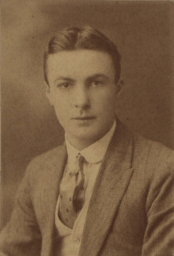Owen Rutter facts for kids
Edward Owen Rutter (born November 7, 1889 – died August 2, 1944) was an English historian, novelist, and travel writer. He explored many parts of the world and wrote exciting books about his adventures and the places he visited.
Before his writing career, Rutter worked in the North Borneo Civil Service from 1910 to 1915. This experience gave him a deep understanding of the region, which he later wrote about in his books.
Contents
Owen Rutter's War Experiences
During the First World War, Owen Rutter returned to Britain. He joined the army in June 1915 and served with the 7th Battalion of the Wiltshire Regiment. He fought in France and on the Salonika front in Greece.
The Song of Tiadatha
While serving in the war, Rutter edited a newspaper called the Balkan News. In this paper, he wrote a funny poem series under the pseudonym "Klip-Klip." A pseudonym is a fake name used by a writer. This poem was a parody of a famous long poem called The Song of Hiawatha.
Rutter's poem was titled Song of Tiadatha. It was about a young, innocent man named "Tiadatha" (which sounds like "Tired Arthur"). The story showed how this young man grew up and became stronger through his experiences in the war. This included fighting on the Macedonian front against the Bulgarians and surviving the Great Thessaloniki Fire of 1917. Many people thought it was one of the best poems from the First World War. Later, it was published as a book. He also wrote a follow-up book called Travels of Tiadatha in 1922.
Adventures and Travels
After the war, Owen Rutter traveled all over the world with his wife. She often took many of the photographs that appeared in his books. They made long stops in many interesting places.
Some of the places they visited included Borneo, Hong Kong, Taiwan (which was known as Formosa back then), Japan, Canada, and the United States. These travels inspired many of his books.
Owen Rutter's Books
Rutter wrote many different kinds of books. He wrote adventure stories, historical accounts, and travel guides.
Some of his well-known books include:
- The Scales of Karma (1940)
- Pirate Wind (1930)
- Triumphant Pilgrimage: An English Muslim's Journey from Sarawak to Mecca (1937)
- Pagans of North Borneo (1929)
- Through Formosa: An Account of Japan's Island Colony (1923)
He also wrote books about famous historical events, like the story of Captain William Bligh and the famous Mutiny on the Bounty. One of his novels, Lucky Star, was even made into a movie called Once in a New Moon in 1935. His book Triumphant Pilgrimage told the true story of a man named Gerard MacBryan, who used the fake name "David Chale" in the book.
Later Life and Work
From 1933, Owen Rutter became a partner in a special publishing company called the Golden Cockerel Press. During the Second World War, Major Rutter worked for the Ministry of Information. His job was to write booklets that explained Britain's efforts during the war.
He was also a member of important groups like the Royal Geographical Society and the Royal Anthropological Institute. These groups recognize people who have made important contributions to geography and the study of human societies.
 | Jewel Prestage |
 | Ella Baker |
 | Fannie Lou Hamer |


